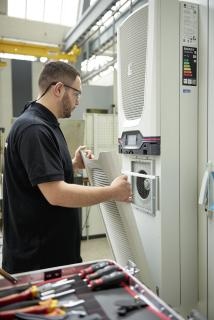Starting on 01 January 2020, there will be bans on the use of certain refrigerants as well as new regulations and rules on the operation, servicing and labelling of cooling and air-conditioning plants. Rittal has the answers to the users of refrigeration equipment questions on what to do now. Thanks to personalised advice and end-to-end service, operators can make their plants fit for the future, meet the requirements of the F gases regulation and improve their energy efficiency.

Reducing fluorinated greenhouse gases is a highly topical issue that is bearing down on the users and operators of refrigeration systems such as car manufacturers. Fluorinated greenhouse gases (F gases) are used as refrigerants in cooling units and climate control systems. In the future, emitting such climate-damaging substances (either as a result of targeted substitution or through the use of alternative technologies) will have to be reduced in order to limit their impact on global warming. EU Regulation No. 517/2014 on fluorinated greenhouse gases (the “F gases regulation”), which has been in force since 1 January 2015, aims to help reduce industrial emissions by as much as 70 percent by 2030, compared to 1990 levels. Specifically, the emissions of fluorinated greenhouse gases (F gases) in the EU will need to be reduced by 70 million tonnes of carbon dioxide equivalent (CO2e) to 35 million tonnes of CO2e in 2030. Starting on 1 January 2020, this will mean bans on the use of refrigerants with a GWP greater than 2,500 as well as new and amended regulations on the maintenance, servicing, leakage checking, certification, disposal and labelling of refrigeration equipment concerned.
Rittal provides personalised assistance
Due to the bans on the use of F gases and on the marketing of products containing them, companies contemplate which cooling units and chillers they will still be allowed to use after 2020. Manufacturing plants, maintenance staff and energy managers can rely on the fact that Rittal have designed their climate control solutions in accordance with the F gases regulation for years so that they do not need to take any further action. As a service partner, Rittal also provides actionable advice for all cooling system users – including non-customers: From determining the actual condition of a system, calculating its efficiency, drawing up a recommendation for action and determining potential savings, setting up and commissioning a new system (including a maintenance contract) to disposing of old devices, Rittal is supporting plant operators with personalised assistance in overcoming the hurdles of the regulations and efficiency requirements. Customers benefit from cost transparency, qualified service technicians and warranty extensions. You can contact the Rittal Service on +49 (0)2772 505 1717 or email to [email protected].
Protecting the environment
The EU regulation is focussed on the gradual limitation of quantities of F gases in order to protect the environment. Consequently, industry, plant operators and end users must all gradually switch over to refrigerants with a lower GWP (Global Warming Potential) value. Just how future-proof cooling units will be will depend, among other things, on the refrigerant used. Enclosure cooling units and chillers from Rittal are not affected by these use bans as they operate with a hermetically sealed refrigeration cycle and because they run on approved refrigerant. Rittal provides detailed information on the F gases regulation (EU) 517/2014 in a whitepaper at the following link: https://bit.ly/2KwklLH.
Rittal F-gas calculator provides clarity
With the inception of F gases regulation, operators of refrigeration equipment with a defined amount of refrigerant will be obliged to carry out regular leakage tests. Operators can easily determine the extent to which an existing system is affected by the consequences of the F gases regulation by using the Rittal F-gas calculator: This online tool calculates the GWP value and the corresponding carbon dioxide equivalent based on the type of refrigerant being selected and on the amount of refrigerant being used. The carbon dioxide equivalent determines the action the operator will have to take in order to comply with the regulation.
Here’s how the Rittal F-gas calculator works: https://www.rittal.com/de_de/f-gase/rechner.php?lang=en
All system parameters (as shown on the rating plate), as well as the type of refrigerant and the filling quantity per circuit are entered. The result is the carbon dioxide equivalent of the system. The admissibility of refrigerant replenishment in the event of a leakage, as well as practical advice for the operation of the current system are also shown.
Additional grants and/or subsidies
Investment amortisation periods are always a criterion businesses need to factor in. In addition to possible savings by replacing older climate control systems with new and efficient technology, the payback period can also be shortened by benefiting from grants and/or subsidies. Germany’s Federal Ministry for the Environment (BMU) for instance is promoting and initiating climate protection projects throughout Germany via its National Climate Initiative (NKI). When it comes to efficiency and greenhouse gas reduction, funding is being provided to support system operators. The goal is to increase the energy efficiency, reduce the need for refrigeration and to cut fluorinated greenhouse gas emissions in the refrigeration and climate control technology sector. Plant operators will therefore find they can benefit from subsidies from the BMU or the German Federal Office of Economics and Export Control (BAFA) when replacing enclosure cooling units or chillers. The equipment and which activities are specifically subsidised will be surveyed and checked on a case-by-case basis. A company that specialises in making applications for funding supports plant operators at all the necessary stages and checks whether the same investment measure can be cumulated with other funding programmes. Detailed information on “State subsidies for the replacement of enclosure and process air conditioning” can be found in the white paper at https://bit.ly/2KwklLH.